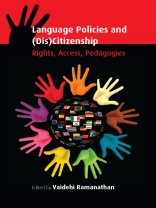This volume explores the concept of ‘citizenship’, and argues that it should be understood both as a process of becoming and the ability to participate fully, rather than as a status that can be inherited, acquired, or achieved. From a courtroom in Bulawayo to a nursery in Birmingham, the authors use local contexts to foreground how the vulnerable, particularly those from minority language backgrounds, continue to be excluded, whilst offering a powerful demonstration of the potential for change offered by individual agency, resistance and struggle. In addressing questions such as ‘under what local conditions does ‘dis-citizenship’ happen?’; ‘what role do language policies and pedagogic practices play?’ and ‘what kinds of margins and borders keep humans from fully participating’? The chapters in this volume shift the debate away from visas and passports to more uncertain and contested spaces of interpretation.
สารบัญ
Chapter 1. Vaidehi Ramanathan: Introduction: Language Policies and (Dis)citizenship: Access, Rights, Pedagogies
Section 1: Citizenship: Reproducing, Challenging, Transforming Discourses and Ideologies
Chapter 2. Sibusiwe Makoni: Language, Gender and Citizenship: Re-framing Citizenship from a Gender Equality Perspective
Chapter 3. Aya Matsuda and Chatwara Suwannamai Duran: Problematizing the Construction of US Americans as Monolingual English speakers
Chapter 4. Emily Feuerherm: Key Words in Refugee Accounts: Implications for Language Policy
Chapter 5. Julia Menard-Warwick: “The World doesn’t end with the Corner of their Street”: Language Ideologies of Chilean English Teachers
Chapter 6. Gemma Punti and Kendall King: A Perfect Storm for Undocumented Latino Youth: Multi-level Marketing, Discourses of Advancement and Language Policy
Chapter 7. Teresa Mc Carty: Language Education Policy, Citizenship, and Sovereignty in Native America
Section 2: Education and Citizenship: Creating (and Constraining) Spaces for Language, Learning and Belonging
Chapter 8. Gopinder Kaur Sagoo: Citizenship as a Social, Spiritual and Multilingual Practice: Fostering Visions and Practices in the Niksham Nursery Project
Chapter 9. Jacqueline Widin and Keiko Yasukawa: Re-imagining Citizenship: Scenes from the Classroom
Chapter 10. Ariel Loring: Classroom Meanings and Enactments of US Citizenship: An Ethnographic Study
Chapter 11. Kate Menken: (Dis) Citizenship or Opportunity: The Importance of Language Education Policy for Access and Full Participation of Emergent Bilinguals in the US
Chapter 12. Rosemary Henze and Fabio Oliveira Coelho: English Learning without English teachers?: The Rights and Access of Rural Secondary Students in Nicaragua
Vaidehi Ramanathan: Editor’s Afterword
เกี่ยวกับผู้แต่ง
Vaidehi Ramanathan is Professor of Applied Sociolinguistics at University of California, Davis, USA. Her previous publications include Language Policies and (Dis)Citizenship: Rights, Access, Pedagogies (Multilingual Matters, 2013) and Bodies and Language: Health, Ailments, Disabilities (Multilingual Matters, 2009).












